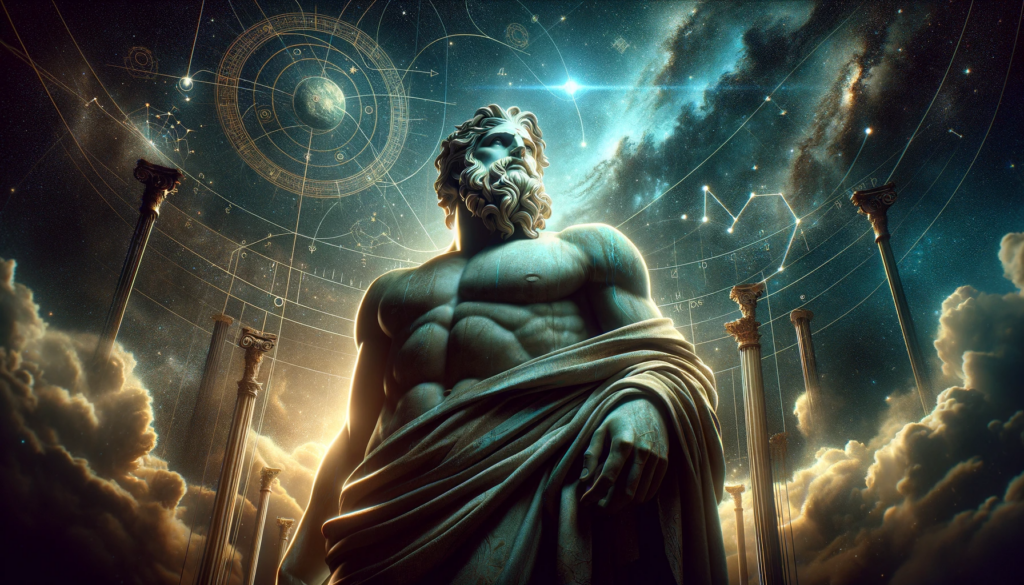Titan God of the North, Titan of Resolve and Intelligence
According to Greek mythology, Coeus is the Titan God of the North, and the Titan of Resolve and Intelligence. He is also the embodiment of the celestial axis around which the heavens revolve. The etymology of Coeus’ name provided scholars to theorise that he was also the God of intellect. That he represented the inquisitive mind, resolve and foresight.

Coeus Origins & Family
Coeus was the son of Uranus and Gaia and was married to his sister Phoebe, the Titan of Radiance and Prophecy. Together, the couple may have possibly functioned as the primal font of all knowledge in the cosmos. Together they had Lelantos (air), Leto (motherhood) who bore Apollo and Artemis by Zeus, and Asteria (Astrology). Coeus is not known for his active role in Ancient Greek religion. His importance really lies in the children he bore. Coeus and Phoebe both possessed the gift of prophecy. They passed this to his grandson, Apollo who eventually would take over the Oracle of Delphi.
The alternative name for Coeus is Polos (“of the northern pole”). This has tied him as being involved in the dethroning of their father, Uranus. Coeus and his brothers personified the great pillars that held heaven and earth apart. He played an important role of holding down Uranus so Cronus could castrate him. The other three pillars represented Hyperion, Iapetus and Crius.
Coeus is considered to be the wisest of the Titans. His intellect combined with his gift of prophecy contributed to the lasting success of the Titans in the war against the Olympians. It was a ten-year war called the Titanomachy, a series of battles fought in Thessaly between the two warring sides long before the existence of humankind. This campaign represented a mythological shift that the Ancient Greeks may have been inspired by the Eastern civilisations.
What Happened To The Titans
Similar myths of a War in Heaven are familiar throughout Europe and the Eastern Ancient world, where one generation of deities opposes the other. In the end, Coeus, along with the other Titans were cast down to Tartarus. Trying to escape and overcome by madness, Coeus broke the chains that had imprisoned him but was forced to stay by Cerberus, the guardian of the underworld. In some stories, Zeus eventually released the Titans. In others they remained stuck in the Underworld for eternity as punishment for rising against the Olympians.
Coeus’ fame is likely due to his grandchildren Apollo and Athena. Apollo was the God of music, healing, light and truth and was known as the Archer. He had the necessary task of harnessing his four-horse chariot to move the sun across the sky. Apollo also inherited his grandfather’s prophetic abilities and was in charge of the Oracle in Delphi.
Two distinct cults were attributed to his worship. Athena was the goddess of reason and wisdom, intellectual activity, courage, civilisation, law and justice, strategic warfare, arts and literature. Athena often aided heroes in their journeys throughout Greek mythology and was an extremely competent war strategist. Athens was aptly named after Athena who embodied the idea of civilisation, arts, law and justice.
Other Interesting Facts About Coeus
- Coeus respective Roman deity was Polus – the celestial ‘axis mundi’ around which the heavens revolved
- Represented in art – Coeus is portrayed with large round eyes, with long wavy hair and a long wavy beard. He is often depicted as a wise, elder figure with a serene and contemplative demeanor
- Symbol of Intellectual Pursuit – Coeus represented the quest for knowledge and intellectual pursuit in Greek mythology, embodying the spirit of inquiry and wisdom.
- During the Titanomachy – Coeus played a significant role. His wisdom and strategic insights were crucial for the Titans’ strategies against the Olympians.
- Oracle of Delphi – Through his lineage, had a profound connection to the Oracle of Delphi, one of the most important religious sites in Ancient Greece, as his grandson Apollo later presided over it.
- Influence on Greek Philosophy – The attributes of Coeus, especially his association with intellect and foresight, likely influenced early Greek philosophical thoughts about the mind and knowledge.
- Astronomical Context – In some interpretations, Coeus is linked to the celestial pole and the concept of the revolving heavens, which could be seen as an early understanding of astronomical movements.
- Legacy in Literature – Coeus is mentioned in various works of ancient literature, where his character is explored in the context of the Titan’s wisdom and knowledge.
- Concept of Order – Coeus’ role in maintaining the balance between heaven and earth reflects the Greek mythological theme of order versus chaos, a central concept in many myths.
- Cultural Impact Beyond Greece – The myth of Coeus, like many Greek myths, had an impact beyond Greece, influencing Roman mythology and later European artistic and literary traditions.
Link/cite this page
If you use any of the content on this page in your own work, please use the code below to cite this page as the source of the content.
Link will appear as Coeus: https://greekgodsandgoddesses.net - Greek Gods & Goddesses, January 15, 2017